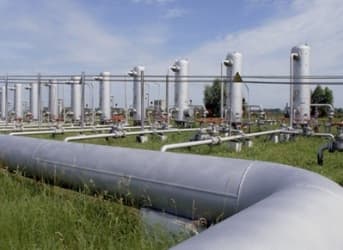U.S. President Barack Obama met Wednesday with Pakistani Prime Minister Sharif in the Oval Office. Their meeting followed on the heels of a damning report from Amnesty International questioning the legality of U.S. drone missile strikes on suspected terrorist targets inside Pakistan. Bilateral relations between Islamabad and Washington have been tepid at best since the terrorist attacks of Sept. 11, 2001. Pakistan, however, may be doing more in Washington than looking to allay national security concerns. Ahead of the meeting, Islamabad reportedly scrambled its legal officials to gauge the prospects for a natural gas pipeline long planned from Iran. Washington opposes the natural gas pipeline because of its economic potential for Tehran. But given Iran's recent diplomatic moxie, it may be two against one.
An early readout from Vice President Biden's office said Washington is committed to standing beside a "strong, democratic [and] prosperous Pakistan." Bilateral ties hit a low point in 2011 when the now notorious SEAL Team Six killed al-Qaida leader Osama bin Laden at his Pakistani compound without Islamabad's prior knowledge. Ties are complicated further by U.S. drone strikes inside Pakistani territory, which Amnesty International said Tuesday may be a violation of international law.
Related article: Iran-Oman Natural Gas Pipeline to Begin Operation in 18 Months
Islamabad ahead of Wednesday's meeting in Washington said it was mulling various prospects to get the U.S. government's support for a natural gas pipeline from Iran. The Pakistani government in January backed an agreement where Iran would provide $500 million to support the pipeline's construction across the border. Pakistan is struggling to keep the lights on and sees the 310 billion cubic feet of gas slated from Iran each year as a panacea for its energy woes. Pakistani authorities argue that, since the pipeline would be overseen by organizations outside the government, U.S. sanctions wouldn't apply. Pakistani Prime Minister Sharif came to power early this year in part by promising to bring the Pakistani people in from the dark. The U.S. State Department, however, brushed off suggestions the project would actually get off the ground. If it does, it may trigger sanctions on Iran.
But that concern was targeting the Iran under Mahmoud Ahmadinejad. Under new President Hassan Rouhani, the trajectory may be a bit different. British Foreign Secretary William Hague said Oct. 8 there was "no doubt" Iran under Rouhani was different from the Ahmadinejad's Iran. Both sides, he said, were taking tentative steps to restore diplomatic ties severed when the British Embassy in Tehran was attacked in 2011. On Tuesday, the British government said it was ready to re-open its Rhum natural gas field in the North Sea. The field is co-owned by BP and the Iranian Oil Co. Gas production was halted in 2010 because of sanctions imposed on Iran but the British government said it now "supports restarting production at Rhum."
Related article: Washington Threatens Pakistan with Sanctions if it continues with Iran Pipeline
Pakistani Finance Minister Ishaq Dar last week called on Iran to help finance the project's development. Sanctions are getting in the way of Islamabad's ability to raise finances of its own because "international financial agencies are shying away." Washington's preferred pipeline from Turkmenistan has support from the Asian Development Bank. A report from the Pakistani Sustainable Development Policy Institute, meanwhile, warns high natural gas prices from Iran would be a "death sentence" for Pakistan's economy. Nevertheless, Pakistan may be caught in the middle of a tug-of-war between Iran and Washington. But given the bilateral interests on the Asian side, it's Washington that may be the odd man out.
By. Daniel J. Graeber of Oilprice.com


















